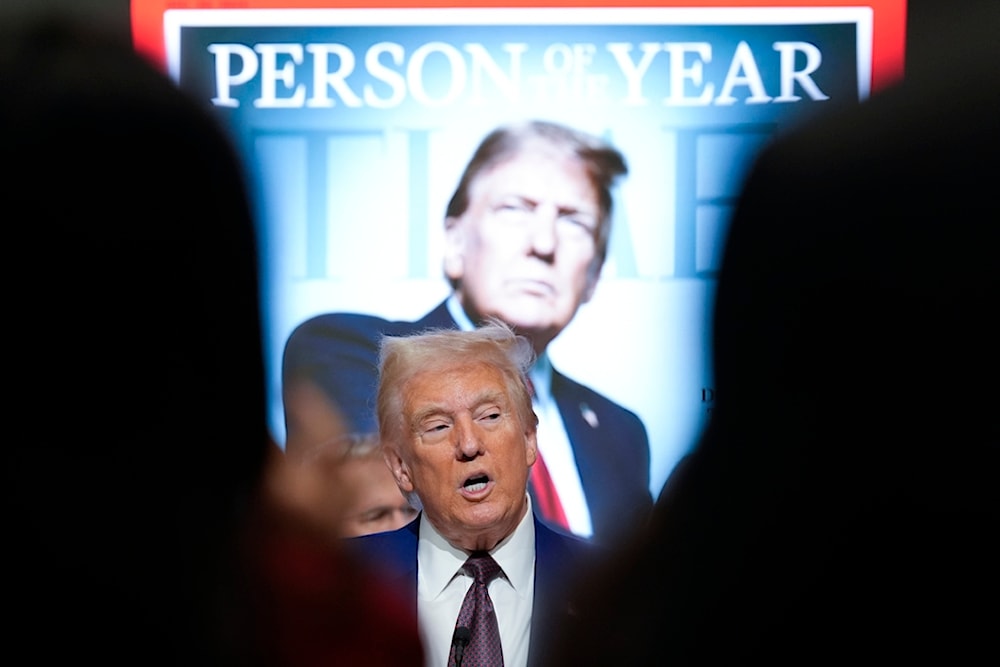Trump slams US missile policy in Ukraine as 'crazy'
US President-elect Donald Trump criticized Ukraine's use of US-supplied long-range missiles for strikes in Russia, calling it a dangerous escalation and signaling a potential shift from President Biden's policy.
-

President-elect Donald Trump speaks during a Time magazine Person of the Year event at the New York Stock Exchange, Thursday, December 12, 2024, in New York. (AP)
In an interview with Time magazine published Thursday, US President-elect Donald Trump criticized Ukraine's use of US-supplied long-range missiles to strike deep into Russian territory, signaling a potential shift in US policy once he assumes office.
Trump described the strikes as a dangerous escalation in the nearly three-year-long war and suggested that current US policy is exacerbating the conflict.
"It's crazy what's taking place. It's crazy," Trump said. "I disagree very vehemently with sending missiles hundreds of miles into Russia. Why are we doing that? We're just escalating this war and making it worse. That should not have been allowed to be done."
Read more: Ukraine peace talks may begin this winter, Polish PM says
The remarks come weeks after President Joe Biden lifted restrictions on Ukraine's use of US-supplied missiles for deep strikes against Russian targets.
The policy change was in response to Russia's alleged deployment of 15,000 DPRK troops along the front lines, a move that Washington described as a significant escalation in the conflict despite having no concrete evidence to substantiate these claims.
Biden's decision followed urgent pleas from Ukrainian President Volodymyr Zelensky, who argued that such capabilities were crucial to repelling Russian forces and protecting Ukrainian sovereignty.
Trump's Approach to Ending the War
Trump has consistently called for a swift resolution to the war, which he views as unsustainable in terms of its human and economic toll. In the interview, Trump hinted at having a "very good plan" to bring the conflict to an end but declined to reveal details, stating, "If I reveal it now, it becomes almost a worthless plan."
"The number of people dying in the conflict is not sustainable," Trump added. "I'm talking on both sides. It's really an advantage to both sides to get this thing done."
Read more: Trump's Ukraine envoy proposes cutting weapons to force peace talks
Last weekend, Trump met with Zelensky and French President Emmanuel Macron in Paris to discuss the war.
While the specifics of their discussions remain unclear, observers suggest that the meetings indicate Trump is positioning himself as a mediator capable of proposing a resolution to the conflict.
Europe's Growing Concerns
Trump's remarks have amplified European anxieties about the future of transatlantic relations and the continent's security. European leaders, including Germany's Foreign Minister Annalena Baerbock and EU foreign policy chief Josep Borrell, have recently highlighted the need for Europe to take greater responsibility for its defense amid shifting US priorities.
Baerbock has called for European countries to surpass NATO's 2% GDP defense spending target, arguing that the challenges facing Europe, including the war in Ukraine, demand greater investments and collaboration within the European defense industry. "The 2% guideline will no longer be sufficient in our current situation," Baerbock said, urging for bold and unified European initiatives to strengthen the continent's security.
Borrell, meanwhile, warned of "far-reaching consequences" for the EU-US relationship if Trump follows through on proposals like imposing tariffs on European goods or deprioritizing Europe in favor of addressing geopolitical tensions with China and "Israel". "This could destabilize economic ties and weaken our collective security framework," Borrell told the European Parliament in November.
An opinion piece in Le Monde by Alexandr Burilkov and Guntram Wolff further underscored these concerns, arguing that Europe can no longer rely on American protection. The authors cited a “crumbling defense industrial base” in the US, weakened by the demands of prolonged conflict and domestic economic challenges, as a sign that Europe must urgently invest in its own defense capabilities.

 4 Min Read
4 Min Read











